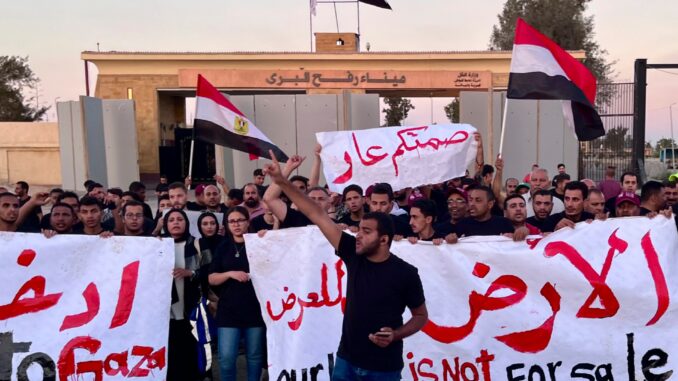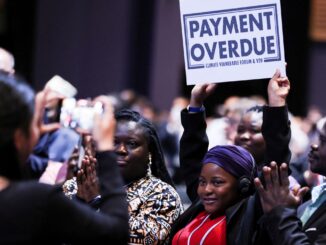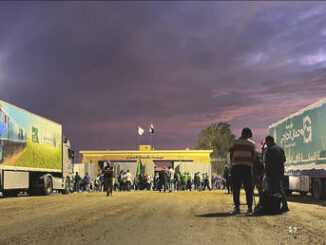
“Open the Rafah crossing point!” This is, among other things, what several hundred demonstrators chanted while gathered on the evening of Wednesday, October 18 in front of the headquarters of the journalists’ union in the centre of Cairo.
As if their cries had been heard, at the same time, the office of Israeli Prime Minister Benjamin Netanyahu announced that “Israel will not prevent humanitarian aid from Egypt as long as it concerns food, water and medicines for the civilian population in the south of the Gaza Strip” – aid coming through the sole border crossing that the besieged Palestinian enclave shares with Egypt.
list of 4 items
list 1 of 4
Several Palestinians killed by Israeli forces in the occupied West Bank
list 2 of 4
Stop Israel now – the Middle East cannot take another major warGa
list 3 of 4
Palestinian child in shock after surviving Israeli attack in Gaza
list 4 of 4
Israel’s war on Gaza: Is the West Bank under increased attack too?
end of list
A wind of relief swept through the demonstrators as they continued singing. But for one of the journalists who wished to remain anonymous, this is only the first step.
“The opening of the crossing was from the beginning a humanitarian necessity. What happened in Gaza and what is still happening is a humanitarian crime and collective punishment rejected by all international conventions. Now the decision we need is that the UN Security Council imposes a ceasefire,” he said.
Humanitarian aid will not arrive in Gaza until at least Friday, October 20, even if the gates open sooner. On October 19, Egyptian workers were seen repairing the damage caused by four consecutive Israeli bombings in one week on the infrastructure of the Palestinian side – along the only entry point into Gaza that Israel does not control.
The Rafah crossing has effectively been closed since Israel began bombarding the Gaza Strip, home to 2.3 million Palestinians, and imposed a total blockade on food, water, fuel and electricity in retaliation from Hamas’s surprise attack on October 7.
At least 1,400 people were killed in Israel, while more than 3,700 Palestinians have been killed by ongoing Israeli air strikes in Gaza. International aid was piling up on the Egyptian side of the border, particularly at El Arish International Airport. More than a hundred trucks loaded with humanitarian supplies are waiting for their transfer near the Rafah crossing point.
The opening of the crossing point has been demanded for many days by the Egyptian authorities and many Arab countries. Twice last week, a rumour of an agreement circulated, suggesting its imminent opening. But nothing happened.
“Until now, the Israeli government has not taken a position on opening the Rafah crossing from the Gaza side to allow the entrance of assistance and exit of citizens of third countries,” declared Egypt’s Minister of Foreign Affairs Sameh Shoukry on October 16.
It was ultimately through the mediation of United States President Joe Biden, who visited Israel on October 18, that Israel finally agreed to the entry of humanitarian aid into the Gaza Strip. Initially, 20 trucks will cross, Biden noted on the plane taking him back to Washington, DC. “We are going to get people out,” Biden said.
More than 500 foreign nationals or dual-national Palestinians, massed on the other side of the border, have been awaiting their evacuation for almost a week. They include several Palestinian Americans.
Yet, in Cairo, concern persists over the prospect of forced population displacements imposed by Israel spilling over into Egyptian territory.
On several occasions since the October 7 attack, Israeli officials have suggested setting up refugee camps in Sinai to accommodate civilians from Gaza.
That would be crossing a “red line”, Egyptian President Abdel Fattah el-Sisi has said, opposing “the liquidation of the Palestinian issue through military instruments, or any attempts to forcibly displace the Palestinians from their land, or for this to happen at the expense of countries in the region”.
It’s a sentiment that the journalists’ union echoed.
“Neither Negev, nor Sinai, Palestine is ours,” protesters from the union chanted on Wednesday evening.
Fatma Khafagy, a member of the Socialist Popular Alliance Party, still wants to believe in dialogue. “The Arab countries must be able to bring Netanyahu to the political arena, not that of war, and bring about a two-state solution,” she said. “Palestine belongs to the Palestinians and they must be able to stay there.”
For many Palestinians living in Cairo, the idea that a new mass displacement of Palestinians — as happened in 1948 during the creation of Israel — could occur is more fantasy than a real risk.
“The people of Gaza are heroes and if they have to die, they will die on their land,” Mahmoud Waleed, originally from Rafah in the Gaza Strip, says with a look of pride. Since the start of the conflict on October 7, Waleed, who works in a furniture factory, has himself tried three times to return to Gaza — in vain.
The Egyptian army prohibits entry into North Sinai. So Mahmoud tries to help his compatriots who are victims of Israeli fire in the enclave. With several friends from the Palestinian community in Cairo, they launched an appeal for donations which was successful.
“We managed to fill the trunks of about seven cars with food, blankets, clothes and medicines,” explained the 34-year-old. All this was transported to the border area on October 17 with the help of the Egyptian Red Crescent.
But others are more worried about how far Israel might go in its attack on Gaza.
“There is an Israeli plan of ethnic cleansing, that is what they are pushing towards,” said Nada, a human rights activist from Ramallah in her 30s.
“Most of them [Palestinian people] do not want to leave Gaza. We must remember that a large percentage of them are already refugees and they do not want to be displaced again.”
As aid remains blocked at the Rafah crossing, and Cairo residents collect donations, many ask when the border will open.
ENB Top News
ENB
Energy Dashboard
ENB Podcast
ENB Substack



